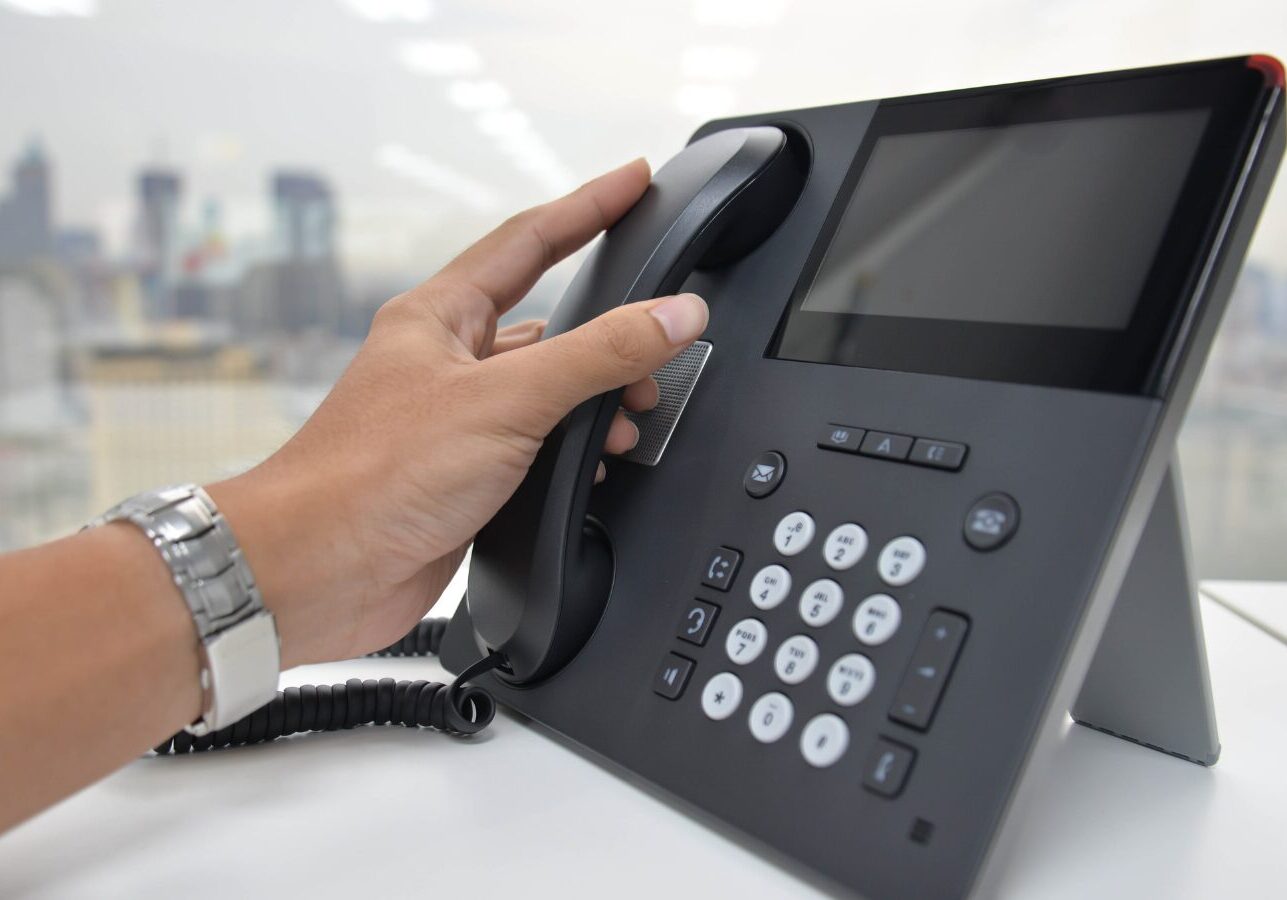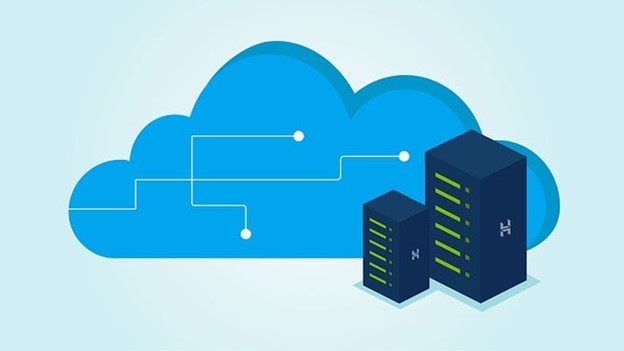
If you’ve heard of cloud phones but aren’t quite sure what they are or how they can benefit your business, you’re in the right place. In this guide, we’ll explain everything you need to know about this virtual phone system, from what it is to how it works and why it might be the perfect fit for your business.
What is a Cloud Phone System?

A cloud phone system is a software-based phone system stored on cloud servers. Which means it doesn’t rely on physical hardware and copper lines like traditional systems. Instead, it sends and receives calls over your existing internet connection using Voice over Internet Protocol (VoIP) technology.
In simpler terms, a cloud-based phone system operates much like your email or social media accounts—it’s all stored “in the cloud” (a.k.a. your cloud provider’s servers) and managed online. All you have to do is log into your provider’s platform, and you’ll have instant access to voicemails, instant messages, virtual meetings, and more.
But let’s not get ahead of ourselves.
What are cloud servers? Cloud servers are, essentially, virtual storage spaces that exist on powerful computers in your cloud phone provider’s data centers. When you use a cloud phone system, you’re essentially using a service that operates from this virtual space, allowing you to manage your business calls with ease and efficiency.
How Cloud Phone Systems Work

Cloud-based phone systems might sound complex, but they’re actually pretty straightforward once you understand how they operate. We’ll walk you through the typical steps a call takes when it’s made on a cloud phone system.
- A Call is Initiated: You pick up your VoIP phone and dial the number. If you’re using a designated app, the process is similar: you enter the number or select a contact.
- Your Voice is “Translated”: Your phone or app converts your voice into digital data packets that can travel easily over the internet.
- That Translation is Sent to the Cloud: These digital packets are sent to the cloud phone software. Think of it as a virtual telephone exchange that finds the right destination for your call (that’s why many providers call their offerings “cloud PBX”).
- The Software Figures Out the Best Route to Take: The cloud system receives these packets and determines where to route them. It figures out whether the call is going to another VoIP user, a traditional landline, or a mobile phone. It manages this through complex algorithms and databases that keep track of all connected devices and their locations.
- Your Call is Sent to Its Final Destination: The cloud system then routes your call to the recipient. If they’re also using a VoIP service, the call is directed straight to their device. If they’re using a traditional phone, the system converts the digital packets back into a format compatible with the PSTN (public switched telephone network).
- Your Recipient Picks Up the Phone: The recipient’s device receives the data packets, converts them back into sound, and establishes the call. Both parties can now communicate as if they were using a traditional phone.
- The Cloud Phone Service Maintains Call Quality: Throughout the call, the cloud phone system continues to manage the data packets to ensure clear communication. It handles things like call quality, network congestion, and any adjustments needed to maintain a stable connection.
- The Call Ends: When either party hangs up, the call is terminated. The cloud system processes this signal, stops sending data packets, and updates the system to reflect that the call has ended.
This process happens in real time, allowing you to communicate just as you would with a traditional phone system.
5 Major Benefits of Adopting a Cloud Phone System

Now that you’ve got a handle on how a cloud phone system functions, let’s talk about how it can benefit your business. Switching from traditional phone systems to ones based in the cloud can give you all kinds of advantages, but we’re going to be focusing on the top five:
1. Cost Savings
One of the biggest benefits of a cloud-based phone system is that it can save businesses a lot of money. Traditional phone systems can be expensive because they require hardware like phone lines, handsets, and maintenance.
With cloud phone systems, however, most of these costs are reduced or eliminated. There’s no need for bulky equipment because everything is hosted online. Plus, businesses usually pay a predictable monthly fee, which makes budgeting easier. This means companies can save money on both setup and ongoing costs.
2. Flexibility and Scalability
Need to scale up or down quickly? No problem! Whether you’re running a small startup or a large enterprise, a cloud phone system makes it super easy.
Hire more employees? Just add phone lines with a few clicks.
Downsizing? Reduce the number of lines without being stuck with unused equipment.
It’s perfect for businesses that experience seasonal changes or are expanding at a healthy rate. Plus, all the management is done online, so you can focus on growing your business without the hassle of technical issues.
3. Remote Work and Mobility
With remote work becoming the new normal (nearly half of full-time employees in the U.S. were working remotely in 2022, according to Gallup), staying connected and productive is more important than ever. And only a cloud phone system can make that happen.
Why?
Because it lets your team make and receive calls from anywhere, using any device with an internet connection. This means your sales teams, customer service reps, and employees at different locations can stay connected and work efficiently, no matter where they are. Your team will love the work flexibility, and you’ll love the increase in productivity.
4. Advanced Features and Integrations
A cloud phone system comes with a range of advanced features that traditional systems often lack. For example, Beardon’s business phone system boasts:
- HD Voice Quality: Enjoy crystal-clear voice calls, ensuring every conversation is clear and professional.
- Video Conferencing: Host high-quality video meetings that make virtual collaboration easy and effective.
- Voicemail-to-Email: Receive voicemails directly in your email inbox, so you can listen to messages anytime, anywhere.
- Call Recording: Record calls for training, quality assurance, or legal purposes, with easy access to playback and review.
- Easy To Use App: Stay connected with a user-friendly mobile app that lets you manage your phone system from anywhere.
- Multi-Device Support: Use your phone system on smartphones, tablets, and computers, providing flexibility and convenience.
- Virtual Numbers: Establish a local presence in different regions without needing physical offices by using virtual business numbers.
- Call Forwarding: The system can forward calls to your cell phone or other devices, ensuring you never miss an important call while maintaining your business caller ID.
- Unified Communications Management: Easily manage phone systems for various office locations under one unified platform, streamlining communication across your business.
- Auto Attendant: Greet callers and provide them with a menu of choices to ensure they reach the correct team members.
Plus, cloud systems like ours can easily integrate with CRM software, streamlining processes and improving data management. This makes it easier to track customer interactions and meet their needs.
5. Reliability and Disaster Recovery
A VoIP cloud phone system is generally more reliable than a traditional one. They have built-in redundancy, which means that if one part of the system fails, another can take over without any service interruption. This reliability is important for businesses that rely heavily on phone communication.
Moreover, cloud phone services often include disaster recovery features. For instance, if there’s a power outage or a natural disaster, the system can reroute calls to other locations or mobile devices, ensuring that the business can continue to operate smoothly.
And that’s just the tip of a rather large iceberg! These five benefits and more make cloud-based phone systems an excellent choice for businesses of all sizes.
Considerations When Switching to a Cloud Phone System

While cloud-based phone systems offer numerous advantages, there are some considerations to keep in mind:
Internet Dependence
These systems need a fast and stable internet connection to work well. If your internet is slow or unreliable, you might experience issues like dropped calls or poor sound quality. Make sure your internet provider can handle the demands of your cloud phone system, especially when many people are using it at the same time.
Third-Party Management
When you use this type of business phone service, your data is going to be handled by that service provider. So it’s incredibly important to check out your provider’s security measures. Check potential providers for their security measures, data privacy policies, and customer support. Look for certifications like ISO 27001 or SOC 2 to ensure they follow industry standards for data protection.
Analog Device Compatibility
If your office uses old-fashioned devices like fax machines, you might just need some special adapters to connect them to your new cloud system. Make sure to check with your cloud phone provider to see if these adapters are compatible, and give them a test run to ensure everything works smoothly without any hiccups.
Compliance and Legal Considerations
Depending on your industry, you may need to follow specific rules about data security and communication. Ensure your cloud phone system provider complies with relevant standards like GDPR, HIPAA, or PCI-DSS, and that they can provide proof of compliance.
Vendor Support and Service Level Agreements (SLAs)
Check the level of support offered by potential providers. Look for vendors that provide 24/7 customer support and have clear agreements outlining their commitments to uptime, response times, and issue resolution. This ensures you get help quickly when needed.
Preparing For Future Advancements
When choosing a cloud phone system, think about your business’s long-term needs. Pick a provider that regularly updates its technology to keep up with industry advancements. This will help ensure your cloud phone system stays ahead of the curve as your business and the market continue to change.
Beardon Services: Your Trusted Cloud Service Provider

When it comes to finding the right cloud phone system for your business, Beardon Services is a name you can trust. With over 31 years of IT consulting experience, our team can give you the business phone system you deserve, no matter your size or your industry.
Our systems are user-friendly, reliable, and packed with powerful features. We focus on cost savings and excellent local service, giving you peace of mind and the flexibility to prioritize your bottom line.
Ready to make the switch? Contact Beardon Services today to enjoy all the benefits of modern technology while leaving the complexities to us.
